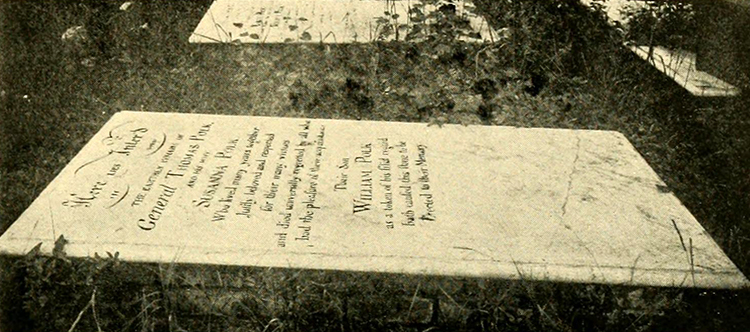1732–25 Jan. 1794
Thomas Polk, revolutionary officer, planter, and politician, was the great-grandson of Robert Bruce Polk, an immigrant from Northern Ireland who settled in Maryland sometime before 1687. Thomas was born to William and Margaret Taylor Polk around 1732 in Cumberland County, Pa., to which his father had moved from Maryland. In 1753, along with two of his brothers, Thomas moved to Anson County, N.C. Two years later he married Susanna Spratt, and they became the parents of eight children: Thomas, William, Ezekiel, Charles, Margaret, Mary, Martha, and James.
Through a combination of personal qualities and a relatively superior education, Polk quickly achieved a position of leadership in the community. In 1765 he led settlers in a rather violent local movement, which became known as the War on Sugar Creek, against Henry Eustace McCulloh, the land agent for George Selwyn. After promoting the establishment of Mecklenburg County and the town of Charlotte, he became a justice of the peace for the county, a commissioner, and the first treasurer for the town. Polk represented Mecklenburg County in the House of Commons from 1766 to 1771 and in 1773–74. As a captain of militia Polk aided Governor William Tryon in his expedition against the Regulators. In 1772 he was engaged as a surveyor in establishing the North Carolina–South Carolina boundary line.
Thomas Polk was active during the Revolutionary crisis, involved in such things as shaping the public mind, intimidating the Loyalists, and drafting and adopting the Mecklenburg Resolves of 31 May 1775. This document declared null and void all commissions granted by the Crown and provided for a reorganization of county government. As a member of the Third Provincial Congress, he sat on a committee that established a temporary state government. In December 1775, as a colonel of militia, he participated in the "Snow Campaign" against Loyalists in upcountry South Carolina.
When the Fourth North Carolina Continental Regiment was formed, Polk was appointed its colonel. The regiment first joined Brigadier General James Moore in the Lower Cape Fear before marching north in the spring of 1777 to reinforce the main army of General George Washington. He participated in the Battle of Brandywine and was at Valley Forge. In February 1778 he returned to North Carolina in an attempt to gather supplies and recruits for his command. He had hoped to be promoted to brigadier general to succeed Francis Nash, who had been killed at Germantown, but he was passed over. This disappointment, coupled with the consolidation of the Fourth Regiment with the Second, led him to resign his commission on 26 June and become a civilian once again.

Nevertheless, Polk returned to military life in the summer of 1780, when he accepted two appointments, the first as commissary general of purchases for North Carolina and commissary of purchases for the Continental troops under General Horatio Gates, newly appointed commanding general of the Southern Department. The other appointment came from the provincial Board of War and made him superintendent commissary for the Salisbury District. When Lord Charles Cornwallis invaded the state, Polk was active in the resistance and often pledged his own credit in securing supplies. But his talents were spread too thin, and he became angry when there were accusations that his "conduct was deemed doubtful and suspicious." Thus he resigned the post, although he did continue to serve for a while under Nathanael Greene, who succeeded Gates. Polk, who was held in high esteem by Greene, was appointed brigadier general in the spring of 1781, but the Assembly gave him a commission as "colonel commandant" which Polk refused to accept although he continued his duties until relieved in May.
In 1783 and 1784 the General Assembly elected Polk to the Council of State, and in 1786, delegate to the Continental Congress; there is no record of his attendance at the Congress. He was also a promoter and trustee for Queen's College (1771) and served in a similar capacity for Liberty Hall (1777) and Salisbury (1784) academies. By 1790, he owned much land and enslaved forty-seven people. When George Washington made his southern tour in 1791, Polk served as his host in Charlotte. Polk died at his home there.